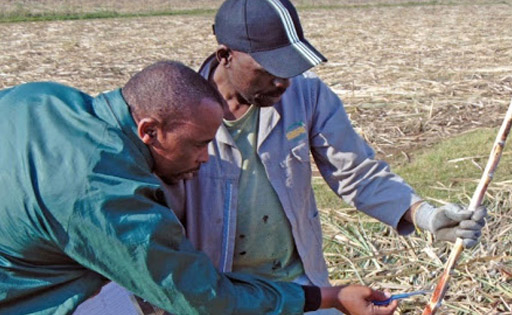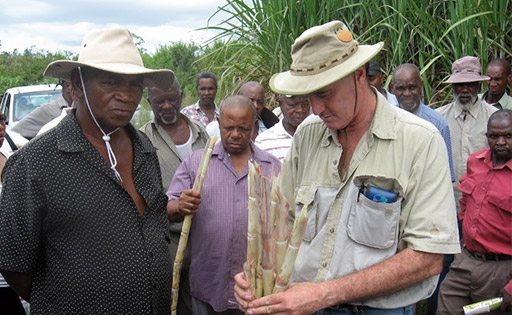Weed Control
INTEGRATED MANAGEMENT OF WEEDS
Weeds pose a serious problem in the South African sugar industry and, in extreme cases, can lead to complete crop failure. Weeds are normally grouped into the three categories, namely, Broadleaf Weeds, Grasses and Sedges. The effect that these weeds have on cane yield will depend on crop growth vigour and the type of weed. Weeds are less of a problem in a fast-growing crop.
SASRI advocates an integrated pest management (IPM) approach to weed control, i.e. a sustainable approach which combines biological, cultural, physical and chemical tools in a way that minimises economic, health and environmental risks.
INFORMATION SHEETS
BOOKS
SASRI Herbicide Selection Guide
Information in this guide must be used in conjunction with herbicide label instructions. Users specify weed types and weed stages and then take note of the active ingredients suggested as treatments. These active ingredients are then linked to a list of specific commercial products. While some additional information is provided for each active ingredient, users must consult the label of the selected products for application guidelines and restrictions.
Weeds of the South African sugar industry
The objective of this book is to provide the South African sugarcane grower with the means to identify weeds without the complication of botanical keys. It will also help the grower make better choices regarding weed control measures. All the weed species that appear in the book were collected from canefields throughout the South African sugar industry and, in most cases, each is shown at the seedling and mature stage of development. It must be appreciated that the list of weeds included is by no means complete and further species will appear in subsequent editions.
Integrated weed management of creeping grasses in sugarcane
Creeping grasses pose a serious problem in the South African sugar industry and, in extreme cases, can lead to complete crop failure. This booklet describes sixteen control tactics for creeping grasses, with a description of the circumstance where each tactic is suitable. These are summarised for easy reference in tables having different weed densities. These tactics are more effective when employed in selected combinations. An Integrated Weed Management (IWM) programme uses appropriate combinations of cultural, mechanical and chemical control tactics which are important for successful weed management.
Understanding the FAS Report: Water Quality
The FAS Agricultural Laboratory undertakes routine irrigation water quality analysis focusing on determination of excess salt and the suitability of the water source for irrigation. In addition, some growers may use this water for agrochemical mixing. Using good quality water is important to optimise the efficacy of chemicals.
Uhlelo oludidiyelwe Iwamasu okulawula utshani obenabayo emobeni
isiZulu version of ‘Integrated weed management of creeping grasses in sugarcane’ described above.
ILLUSTRATIVE GUIDES
DECISION SUPPORT TOOLS
HERBICIDE SELECTOR
SASRI has developed a Herbicide Selector app which takes into account weed spectrum, weed growth stage and clay% and then suggests a range of active ingredients that will work for the chosen criteria. Users can also see a list of commercial products that are available for each active ingredient. Notes are also provided for each active ingredient.
Try Herbicide Selector: https://www.sasri.org.za/HerbicideSelector
Download Agricultural remedies registered for use in South Africa
Videos
Knapsack calibration
Ukugcina amathuluzi okufutha ekhipha isilinganiso esifanele
(Calibrating Spraying Equipment)
Yini edlala ukuthi izibulala khula zingasebenzi?
(What influences efficacy of herbicides?)
Kungani ukhula lungafuneki
Ensimini (Controlling weeds)
Services
Biosecurity
SASRI’s Biosecurity staff work together with Local Pest, Disease and Variety Control Committees to prevent or minimise loss and damage caused by pests and diseases.
Extension and Biosecurity Service
SASRI Extension Specialists located throughout the South African sugar industry are available to offer advice and support on crop nutrition and all other aspects of sugarcane farming.
RESEARCH
Research on weed control develops integrated management strategies that minimise the effects of weeds on crop production in a sustainable manner. Visit CROP PROTECTION for more information.
Subscribe to our News Alerts to receive our latest information.



